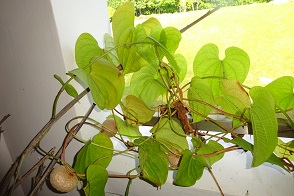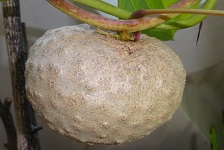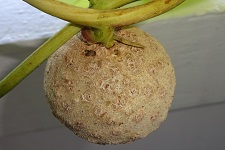| Home | Nature Weekly Index |
26 June 2016 | Air Potato Vine | Dioscorea bulbifera | Traditional Chinese Medicine (TCM) |
I had previously shared my observation on Air Potato Vine and insects that feast on it in July 2014. Most English articles will focus on its invasive nature and potential threat to native plant species. However, the interest from the Chinese articles is mainly on its uses in traditional Chinese medicine (TCM). The vine has many Chinese names and one of them is 黄药子 (Huang Yao Zi). It is the name for the tuber (thickened part of an underground stem) of this vine which is used in TCM.


 Air Potato Vine is a relatively easy plant to grow. All you need is a bulbil (potato-like bulb) which appears in the leaf
axil of the mature vine. Usually, one leaf axil host only one bulbil. The bulbils come in different sizes with larger plant
producing bigger bulbs. The leaf associated to the bulbil appears to support its growth. From what I observed, when the
leaf is gone, the bulbil associated to it stop growing. To grow the plant, simply place a bulbil on the soil. It can be
grown in pot, which is what I had done. Currently, I have an one-year old large specimen along the corridor that has many
big bulbils along the stem. I am very tempted to dig out the whole plant to examine its underground tuber.
Air Potato Vine is a relatively easy plant to grow. All you need is a bulbil (potato-like bulb) which appears in the leaf
axil of the mature vine. Usually, one leaf axil host only one bulbil. The bulbils come in different sizes with larger plant
producing bigger bulbs. The leaf associated to the bulbil appears to support its growth. From what I observed, when the
leaf is gone, the bulbil associated to it stop growing. To grow the plant, simply place a bulbil on the soil. It can be
grown in pot, which is what I had done. Currently, I have an one-year old large specimen along the corridor that has many
big bulbils along the stem. I am very tempted to dig out the whole plant to examine its underground tuber.
Both the bulbil and tuber are poisonous and should not be consumed raw. Cooking appears to neutralise its toxicity. However, consuming it over a prolong period of time may damage the liver and kidney according to the warning from TCM practitioners. Hence, folks with liver or kidney problems are advised not to take this tuber. Another tuber used in TCM known as 何首乌 (He Shou Wu) or Chinese Knotweed (Polygonum multiflorum) has a similar appearance with that from the Air Potato Vine. As a result, Chinese Knotweed tuber sold in the market may actually be from the Air Potato Vine. Eating this fake Chinese Knotweed tuber may have serious adverse consequences since tuber of Air Potato Vine is toxic.
After further reading, it appears that the Chinese Knotweed tuber is not as safe as most people tend to believe. In 2014, China health authority issued a warning notice on the potential liver damage that may result from consumption of this TCM. More recently in December 2015, there was one death reported in China that might be the result of overused of this herb to improve hair growth. Cases of liver damage after consumption of this herb had also been reported to the health authority in the United Kingdom. Closer to home, we had a fatal case in June last year that was linked to the use of another very common TCM, cordyceps. There are of course different opinions on the safe use of TCM. Care should always be exercised when using any medication, whether they are from the east or the west.